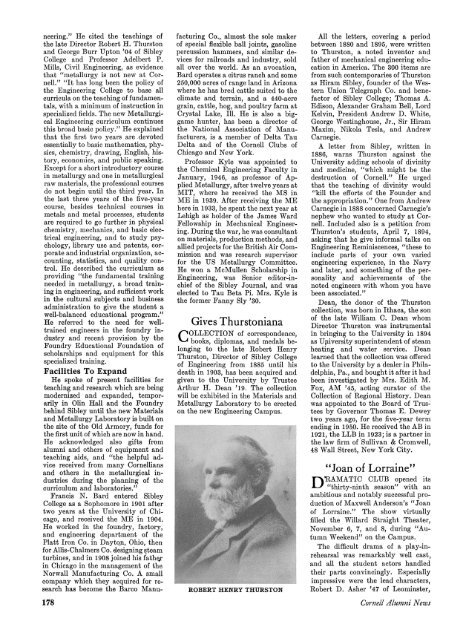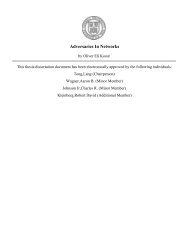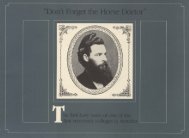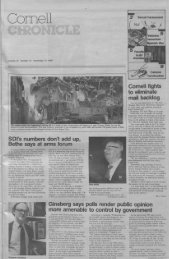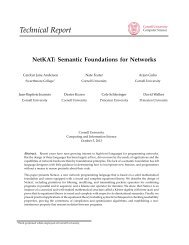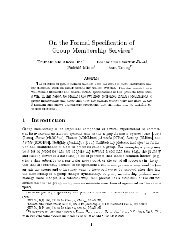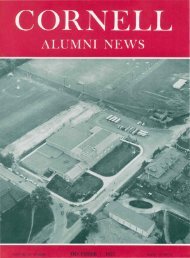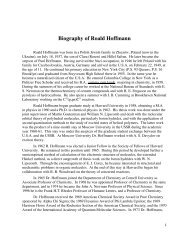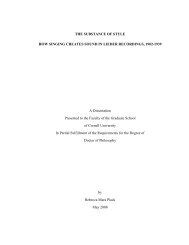Cornell Alumni News - eCommons@Cornell - Cornell University
Cornell Alumni News - eCommons@Cornell - Cornell University
Cornell Alumni News - eCommons@Cornell - Cornell University
Create successful ePaper yourself
Turn your PDF publications into a flip-book with our unique Google optimized e-Paper software.
neering." He cited the teachings of<br />
the late Director Robert H. Thurston<br />
and George Burr Upton '04 of Sibley<br />
College and Professor Adelbert P.<br />
Mills, Civil Engineering, as evidence<br />
that i 'metallurgy is not new at <strong>Cornell</strong>/'<br />
"It has long been the policy of<br />
the Engineering College to base all<br />
curricula on the teaching of fundamentals,<br />
with a minimum of instruction in<br />
specialized fields. The new Metallurgical<br />
Engineering curriculum continues<br />
this broad basic policy." He explained<br />
that the first two years are devoted<br />
essentially to basic mathematics, physics,<br />
chemistry, drawing, English, history,<br />
economics, and public speaking.<br />
Except for a short introductory course<br />
in metallurgy and one in metallurgical<br />
raw materials, the professional courses<br />
do not begin until the third year. In<br />
the last three years of the five-year<br />
course, besides technical courses in<br />
metals and metal processes, students<br />
are required to go further in physical<br />
chemistry, mechanics, and basic electrical<br />
engineering, and to study psychology,<br />
library use and patents, corporate<br />
and industrial organization, accounting,<br />
statistics, and quality control.<br />
He described the curriculum as<br />
providing "the fundamental training<br />
needed in metallurgy, a broad training<br />
in engineering, and sufficient work<br />
in the cultural subjects and business<br />
administration to give the student a<br />
well-balanced educational program."<br />
He referred to the need for welltrained<br />
engineers in the foundry industry<br />
and recent provision by the<br />
Foundry Educational Foundation of<br />
scholarships and equipment for this<br />
specialized training.<br />
Facilities To Expand<br />
He spoke of present facilities for<br />
teaching and research which are being<br />
modernized and expanded, temporarily<br />
in Olin Hall and the Foundry<br />
behind Sibley until the new Materials<br />
and Metallurgy Laboratory is built on<br />
the site of the Old Armory, funds for<br />
the first unit of which are now in hand.<br />
He acknowledged also gifts from<br />
alumni and others of equipment and<br />
teaching aids, and "the helpful advice<br />
received from many <strong>Cornell</strong>ians<br />
and others in the metallurgical industries<br />
during the planning of the<br />
curriculum and laboratories."<br />
Francis N. Bard entered Sibley<br />
College as a Sophomore in 1901 after<br />
two years at the <strong>University</strong> of Chicago,<br />
and received the ME in 1904.<br />
He worked in the foundry, factory,<br />
and engineering department of the<br />
Platt Iron Co. in Dayton, Ohio, then<br />
for Allis-Chalmers Co. designing steam<br />
turbines, and in 1908 joined his father<br />
in Chicago in the management of the<br />
Norwall Manufacturing Co. A small<br />
company which they acquired for research<br />
has become the Barco Manu-<br />
facturing Co., almost the sole maker<br />
of special flexible ball joints, gasoline<br />
percussion hammers, and similar devices<br />
for railroads and industry, sold<br />
all over the world. As an avocation,<br />
Bard operates a citrus ranch and some<br />
250,000 acres of range land in Arizona<br />
where he has bred cattle suited to the<br />
climate and terrain, and a 440-acre<br />
grain, cattle, hog, and poultry farm at<br />
Crystal Lake, 111. He is also a biggame<br />
hunter, has been a director of<br />
the National Association of Manufacturers,<br />
is a member of Delta Tau<br />
Delta and of the <strong>Cornell</strong> Clubs of<br />
Chicago and New York.<br />
Professor Kyle was appointed to<br />
the Chemical Engineering Faculty in<br />
January, 1946, as professor of Applied<br />
Metallurgy, after twelve years at<br />
MIT, where he received the MS in<br />
ME in 1939. After receiving the ME<br />
here in 1933, he spent the next year at<br />
Lehigh as holder of the James Ward<br />
Fellowship in Mechanical Engineering.<br />
During the war, he was consultant<br />
on materials, production methods, and<br />
allied projects for the British Air Commission<br />
and was research supervisor<br />
for the US Metallurgy Committee.<br />
He won a McMullen Scholarship in<br />
Engineering, was Senior editor-inchief<br />
of the Sibley Journal, and was<br />
elected to Tau Beta Pi. Mrs. Kyle is<br />
the former Fanny Sly '30.<br />
Gives Thurstoniana<br />
/COLLECTION of correspondence,<br />
^-Λ books, diplomas, and medals belonging<br />
to the late Robert Henry<br />
Thurston, Director of Sibley College<br />
of Engineering from 1885 until his<br />
death in 1903, has been acquired and<br />
given to the <strong>University</strong> by Trustee<br />
Arthur H. Dean '19. The collection<br />
will be exhibited in the Materials and<br />
Metallurgy Laboratory to be erected<br />
on the new Engineering Campus.<br />
ROBERT HENRY THURSTON<br />
All the letters, covering a period<br />
between 1880 and 1895, were written<br />
to Thurston, a noted inventor and<br />
father of mechanical engineering education<br />
in America. The 300 items are<br />
from such contemporaries of Thurston<br />
as Hiram Sibley, founder of the Western<br />
Union Telegraph Co. and benefactor<br />
of Sibley College; Thomas A.<br />
Edison, Alexander Graham Bell, Lord<br />
Kelvin, President Andrew D. White,<br />
George Westinghouse, Jr., Sir Hiram<br />
Maxim, Nikola Tesla, and Andrew<br />
Carnegie.<br />
A letter from Sibley, written in<br />
1886, warns Thurston against the<br />
<strong>University</strong> adding schools of divinity<br />
and medicine, "which might be the<br />
destruction of <strong>Cornell</strong>." He urged<br />
that the teaching of divinity would<br />
"kill the efforts of the Founder and<br />
the appropriation." One from Andrew<br />
Carnegie in 1888 concerned Carnegie's<br />
nephew who wanted to study at <strong>Cornell</strong>.<br />
Included also is a petition from<br />
Thurston's students, April 7, 1894,<br />
asking that he give informal talks on<br />
Engineering Reminiscences, "these to<br />
include parts of your own varied<br />
engineering experience, in the Navy<br />
and later, and something of the personality<br />
and achievements of the<br />
noted engineers with whom you have<br />
been associated."<br />
Dean, the donor of the Thurston<br />
collection, was born in Ithaca, the son<br />
of the late William C. Dean whom<br />
Director Thurston was instrumental<br />
in bringing to the <strong>University</strong> in 1894<br />
as Uμiversity superintendent of steam<br />
heating and water service. Dean<br />
learned that the collection was offered<br />
to the <strong>University</strong> by a dealer in Philadelphia,<br />
Pa., and bought it after it had<br />
been investigated by Mrs. Edith M.<br />
Fox, AM '45, acting curator of the<br />
Collection of Regional History. Dean<br />
was appointed to the Board of Trustees<br />
by Governor Thomas E. Dewey<br />
two years ago, for the five-year term<br />
ending in 1950, He received the AB in<br />
1921, the LLB in 1923; is a partner in<br />
the law firm of Sullivan & Cromwell,<br />
48 Wall Street, New York City.<br />
D RAMATIC<br />
"Joan of Lorraine"<br />
CLUB opened its<br />
"thirty-ninth season" with an<br />
ambitious and notably successful production<br />
of Maxwell Anderson's "Joan<br />
of Lorraine." The show virtually<br />
filled the Willard Straight Theater,<br />
November 6, 7, and 8, during "Autumn<br />
Weekend" on the Campus.<br />
The difficult drama of a play-inrehearsal<br />
was remarkably well cast,<br />
and all the student actors handled<br />
their parts convincingly. Especially<br />
impressive were the lead characters,<br />
Robert D. Asher '47 of Leominster,<br />
178 <strong>Cornell</strong> <strong>Alumni</strong> <strong>News</strong>


